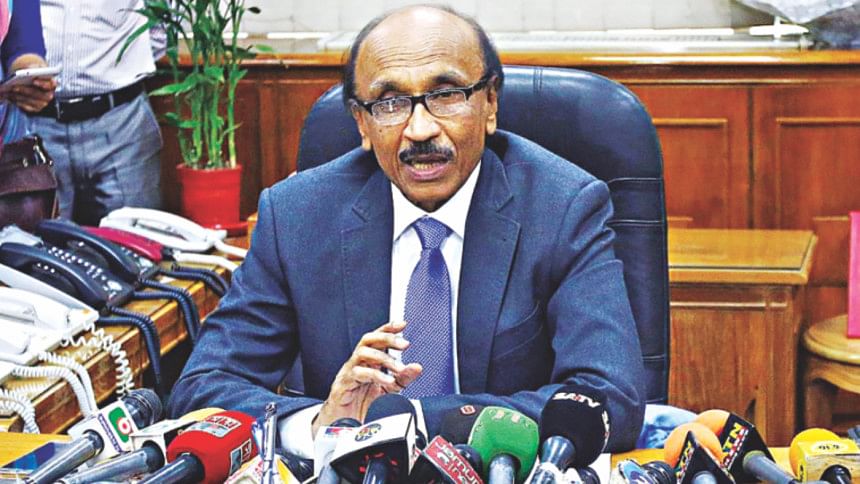Don't pull out funds from private banks

Bangladesh Bank Governor Fazle Kabir has sought the finance minister's intervention to stave off pressure to withdraw government funds from private banks, which has been creating an artificial liquidity crisis and bumping up interest rates for lending.
Citing the case of cash-strapped Farmers Bank, the BB governor said many government organisations are now scrambling to withdraw their deposits, including those for development programmes, from private banks.
“I think a panic button has been pressed without any reason,” Kabir said yesterday at the annual conference of Agrani Bank held at the capital's Le Meridian Hotel, which was attended by Finance Minister AMA Muhith.
He went on to request Muhith to assure all that there is no problem with private banks and that there is no reason to think that it is same in all banks.
“What the public organisations have done was unnecessary -- they should stop now.”
Thanks to their fund withdrawal, banks are now scuppering for deposits to adjust their loan-deposit ratio, and in so doing, are pushing up the interest rate for deposit.
While it is positive news for depositors, it is also pushing up the interest rate for lending. “This is not good for business and the country.”
There is adequate liquidity in the country, as the call money market rate suggests: it is less than 4 percent.
“The word panic was only applicable for capital market until now -- it has spread to the banking sector. This is a much unfounded apprehension.”
About the BB's move to lower the banks' ceiling for loan-deposit ratio, the governor said the ceiling has been slashed by only 2 percentage points.
Of the 57 banks, the loan-deposit ratio of 38 banks is lower than 83 percent already. To adjust to the new ceiling, banks will have to increase the total deposit by Tk 11,000 crore.
Of the amount, Krishi Bank, Rajshahi Krishi Unnayan Bank, BASIC Bank and Farmers Bank would have to increase it by Tk 6,000 crore, while the rest need to increase by Tk 5,000 crore altogether.
“So, it is not right to say that a liquidity crisis has been created in the banking sector due to slashing of the ratio.”
Besides, some private banks had been lending aggressively and the quality of the loans was not good.
“The slight adjustment was needed to bring discipline to lending.”
The central bank governor also touched upon the exchange rate: the high import growth and the comparatively lower export and remittance growth have put a pressure on the foreign exchange rate.
The BB injected about $1.5 billion in the foreign currency market to keep the exchange rate stable. As a result, more than Tk 12,000 crore flowed to the central bank from banks, he added.
Muhith though did not say anything in response to the central bank governor's request for intervention.
However, the finance minister told the bankers to give loans after carefully selecting the projects. He advised them to appoint a panel of experts to scrutinise the projects.
MA Mannan, state minister for finance and planning, said there is a negative public perception about the banking sector and the government is somewhat uneasy about it.
Subsequently, he urged all to work together to restore the public trust.
The bad public image about the banking sector has been created as the steps taken by the government, the banking division, banks and the central bank to remove irregularities are not being projected properly to the wider public, said Agrani Bank Chairman Zaid Bakht. “The corrective steps taken and will be taken have to be presented,” he added.
There are many successes and weaknesses in the state-owned banks, said Yunusur Rahman, senior secretary to the banking division.
Subsequently, he urged the banks to work towards identifying the weaknesses and removing them.

 For all latest news, follow The Daily Star's Google News channel.
For all latest news, follow The Daily Star's Google News channel. 



Comments